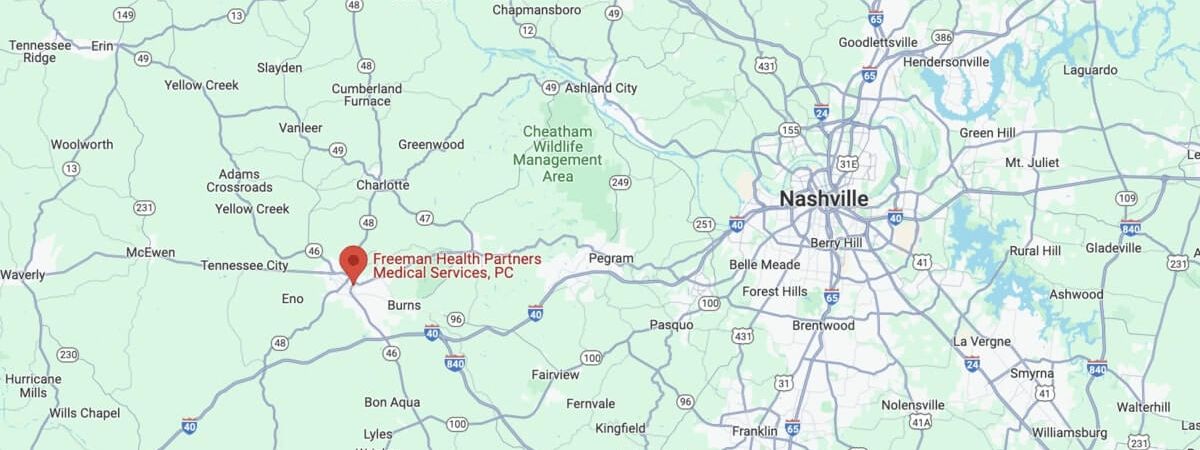Cost of PTSD Treatment and Therapy Services in Nashville, Tennessee
Cost of PTSD Treatment
in Nashville, Tennessee
in Nashville, Tennessee
Freeman Health Partners offers specialized therapy programs and primary care services in Middle Tennessee, including comprehensive support for Post-Traumatic Stress Disorder (PTSD). The cost of PTSD therapy can vary based on individual needs and treatment plans, but Freeman Health Partners strives to provide affordable and accessible care for all patients.
In addition to PTSD therapy, Freeman Health Partners provides diverse programs for mental health, dual diagnosis, and primary care. For those interested in understanding the PTSD treatment cost in Nashville, TN, Freeman Mental Health can offer detailed information on pricing and services to help you make the best decision for your health and well-being.

What is Known As Post-Traumatic Stress Disorder (PTSD)?
Post-Traumatic Stress Disorder (PTSD) is a mental health condition that develops after experiencing or witnessing a traumatic event. People with PTSD may suffer from symptoms such as flashbacks, nightmares, severe anxiety, and emotional numbness, which can disrupt their daily lives and affect their overall well-being.
Treatment for PTSD typically involves therapy methods like cognitive-behavioral therapy (CBT), exposure therapy, and sometimes medication. The specific approach and duration of mental health treatment can vary based on individual needs, the severity of symptoms, and the therapist’s expertise. Effective treatment helps people manage their symptoms, improve their quality of life, and work towards recovery from trauma.
What Are the Signs and Symptoms of PTSD?
The signs and symptoms of Post-Traumatic Stress Disorder (PTSD) include flashbacks, nightmares, severe anxiety, and persistent feelings of fear or helplessness. People may also experience emotional numbness, irritability, and difficulty sleeping. These symptoms can significantly impact daily functioning and overall quality of life.
Treatment for PTSD helps by providing strategies to manage and reduce symptoms. Therapy methods like CBT and exposure therapy can assist patients in processing traumatic experiences, altering negative thought patterns, and gradually reducing distressing symptoms. Effective treatment aims to improve overall well-being, enhance coping skills, and restore a sense of normalcy in daily life.
Middle Tennessee PTSD and Mental Health Statistics and Information
Communities in Tennessee adjacent to military bases often report the highest number of veterans with PTSD. Nationwide, an estimated 3.6% of U.S. adults experienced PTSD in the past year. In Tennessee, the age-adjusted suicide rate is 17.0 per 100,000 people, reflecting the severe impact of mental health issues in the region.
PTSD affects at least 25% of veterans who have endured life-threatening experiences in war zones. Additionally, approximately 3,224,296 people in Tennessee live in areas with insufficient mental health professionals. This shortage underscores the urgent need for improved access to PTSD care and support services across the state, particularly in communities heavily populated by veterans and people struggling with mental health challenges.
How to Find a PTSD Therapy and Treatment Program Near Nashville
To find a PTSD therapy and treatment program near Nashville, start by researching local private mental health rehab facilities cost structures. Explore options like Freeman Health Partners (FHP) for specialized PTSD treatment in Dickson, TN. Additionally, you can consider alternative methods for finding PTSD treatment across Tennessee. For personalized assistance, call FHP at (615) 879-3582 to discuss your needs.

Available Mental Health Programs for PTSD Treatment in Dickson, TN
Freeman Health Partners offers specialized PTSD treatment at our facility located in Dickson, TN. Situated at 222 State Street, Dickson, TN 37055, this center provides comprehensive mental health services made for individuals dealing with PTSD. The location ensures easy access for residents in the surrounding area, offering a range of therapeutic options to support effective recovery.
Alternative Ways to Find PTSD Treatment in Tennessee
Here are some alternative ways to find PTSD treatment in Tennessee:
- Online Directories: Use online directories and resources such as Psychology Today or the National Alliance on Mental Illness (NAMI) to search for local PTSD therapists and treatment programs. These platforms allow you to filter by location and specialty.
- Primary Care Physician: Consult with your primary care physician (PCP), who can provide referrals to mental health professionals specializing in PTSD. They can help coordinate your care and recommend trusted providers.
- Community Mental Health Centers: Explore local community mental health centers that offer PTSD therapy and support. These centers often provide sliding scale fees and affordable options.
- Support Groups: Attend PTSD support groups, which can offer recommendations for experienced therapists and treatment programs based on the experiences of others in similar situations.
- Insurance Provider: Contact your health insurance provider for a list of in-network therapists and treatment centers specializing in PTSD. They can help you understand your coverage and find affordable options.
Free Mental Health Assessments

What Are the Main Causes of Post-Traumatic Stress Disorder?
The main causes of Post-Traumatic Stress Disorder are exposure to traumatic events such as serious accidents, natural disasters, violent attacks, or military combat. Experiencing or witnessing these high-stress situations can overwhelm a person’s ability to cope, leading to the development of PTSD symptoms.
Additional factors, such as a personal history of trauma, a lack of support systems, or pre-existing mental health conditions, can also contribute to the risk of developing PTSD. Each person’s response to trauma is unique, and various elements can influence how severely PTSD affects them.
What are the Different Types of Clinical PTSD Treated with Therapy?
Clinical PTSD can manifest in various forms, each requiring specific therapeutic approaches. Examples include Acute Stress Disorder (ASD), Complex PTSD (C-PTSD), Delayed-Onset PTSD, Comorbid PTSD, Secondary Traumatic Stress (STS), and Developmental Trauma Disorder (DTD). These are just a few examples of the different types, and this list is not exhaustive.
Acute Stress Disorder (ASD)
Acute Stress Disorder (ASD) occurs in response to a traumatic event and is categorized by symptoms similar to PTSD, such as intrusive memories, dissociation, and heightened anxiety. However, ASD arises within the first month after the trauma and lasts for a short duration, typically less than a month. Early intervention can help prevent the development of PTSD.
Complex PTSD (C-PTSD)
Complex PTSD (C-PTSD) develops from prolonged or repeated exposure to trauma, such as ongoing abuse or captivity. It includes symptoms of standard PTSD but also includes difficulties with emotional regulation, self-perception, and interpersonal relationships. People with C-PTSD may experience chronic feelings of shame, guilt, and isolation, requiring specialized therapeutic approaches for effective mental health treatment.
Delayed-Onset PTSD
Delayed-Onset PTSD is a form of Post-Traumatic Stress Disorder where symptoms do not appear until months or even years after the traumatic event. People might initially seem unaffected but later experience classic PTSD symptoms such as flashbacks, nightmares, and severe anxiety. This delayed response can complicate diagnosis and treatment, requiring tailored therapeutic interventions.
Comorbid PTSD
Comorbid PTSD occurs when Post-Traumatic Stress Disorder coexists with other mental health conditions, such as depression, anxiety disorders, or substance abuse. This overlap can complicate diagnosis and treatment, as symptoms of one condition may exacerbate the other. Effective therapy must address both PTSD and any additional disorders to provide comprehensive care and improve overall results.
Secondary Traumatic Stress (STS)
Secondary Traumatic Stress (STS) arises when people, such as caregivers or first responders, are exposed to the trauma experienced by others. Symptoms can mirror those of PTSD, including emotional distress, intrusive thoughts, and heightened anxiety. STS can significantly impact mental well-being, and addressing it requires support and therapeutic interventions fit to the secondary stressor’s impact.
Developmental Trauma Disorder (DTD)
Developmental Trauma Disorder (DTD) results from severe, chronic trauma experienced during critical developmental periods, such as childhood. This disorder includes symptoms similar to PTSD but also involves difficulties with emotional regulation, attachment, and identity formation. Effective treatment for DTD requires a focus on healing early developmental wounds and building healthier emotional and relational skills.
What Therapies Are Used to Treat Clinical PTSD at Freeman Health Partners?
At Freeman Health Partners, a range of therapies is utilized to treat clinical PTSD, tailored to each individual’s needs. Their programs often include:
- Psychotherapy, such as Cognitive Behavioral Therapy (CBT), which helps you process traumatic experiences and alter negative thought patterns.
- Psychiatric medication and medication management to address symptoms and enhance overall treatment effectiveness. Common antidepressants like SSRIs (e.g., sertraline and fluoxetine) are frequently used to help manage PTSD symptoms.
- Transcranial Magnetic Stimulation (TMS), a non-invasive therapy that uses magnetic fields to stimulate nerve cells in the brain and improve symptoms.
These approaches, among others, are integrated to provide comprehensive care and support for managing PTSD effectively at Freeman Mental Health.

We Accept Most Major Insurance Providers in Tennessee
At Freeman Health Partners, we understand the financial concerns that accompany the decision to seek mental health and primary care services. That’s why we’re committed to making our services as accessible as possible by accepting most major insurance providers in Tennessee. This includes Aetna, Carelon, Blue Cross Blue Shield, Cigna, and Humana.
Our goal is to ensure that everyone who needs our help can receive it, regardless of their insurance coverage. We encourage you to take the first step towards better mental health by filling out our online form. This will allow us to determine your health insurance coverage levels for mental health and primary care services. By understanding what services your insurance covers, you can start your journey with confidence, knowing that you have the financial support you need.




Check Your Insurance By Phone

What Are the Different Types of Treatment Programs for PTSD in Middle Tennessee?
In Middle Tennessee, various treatment programs are available for managing PTSD, each customized to different levels of care and intensity. Options include outpatient programs, Partial Hospitalization Programs (PHP), and Intensive Outpatient Programs (IOPs). Each type offers unique benefits depending on the severity of symptoms and the level of support needed.
Outpatient Programs for PTSD in Nashville
Outpatient programs for PTSD in Nashville provide flexible, supportive treatment for managing symptoms while allowing you to maintain daily responsibilities. These programs often include behavioral therapy and psychological support to enhance emotional well-being and cognitive function. They are designed to address wellness and mental health disorders with approaches that promote recovery and improve overall psychological health.
Partial Hospitalization Programs (PHP) for PTSD in Nashville offer intensive treatment while allowing patients to return home each evening. These programs include comprehensive therapy sessions that address psychiatric conditions, mood disorders, and anxiety treatment. With a focus on stress management and coping strategies, PHP provides crucial mental health support and foster mental health awareness and self-care practices for PTSD.
IOP for PTSD in Nashville
Intensive Outpatient Programs (IOP) for PTSD in Nashville offer structured, flexible treatment for those needing more support than outpatient care but less intensive than PHP. These programs include regular therapy sessions focusing on managing PTSD symptoms, stress reduction, and developing effective coping strategies. IOP helps improve emotional well-being while accommodating daily responsibilities.
How Much Does Mental Health Treatment for PTSD Cost?
The PTSD treatment cost can vary widely. On average, PTSD therapy expenses range from $100 to $250 per session. The pricing for PTSD treatment is influenced by factors such as the therapist’s qualifications, the type of therapy, and the location of the services.
Affordable options for PTSD therapy are available, with some mental health care providers offering budget-friendly PTSD support. Rates for PTSD counseling can also vary based on insurance coverage and sliding scale fees. Exploring cost-effective options and affordable mental health services can help you manage the average cost of PTSD treatment and find suitable support for their needs.
How Much Does PTSD Therapy and Treatment Cost in Tennessee?
So, how much does mental health treatment cost in Nashville, TN? It typically ranges from $100 to $250 per session. This variation depends on factors such as the therapist’s credentials, the type of therapy provided, and the location of the services. Prices may be influenced by whether the treatment is provided on an outpatient, partial hospitalization, or intensive outpatient basis.
Additionally, the overall cost can vary based on insurance coverage and any sliding scale fees offered by providers, like Freeman Health Partners. It’s important to explore different options and discuss potential costs with us to find mental health treatment affordability and solutions that meet your circumstances.
How Much Does IOP Treatment for PTSD Cost Near Nashville, Tennessee?
The cost of Intensive Outpatient Program (IOP) treatment for PTSD near Nashville, Tennessee generally ranges from $200 to $500 per session. This variation depends on factors such as the program’s intensity, the specific therapies included, and the facility’s location. Rates may also be influenced by the level of care and support provided.
Additional factors, such as insurance coverage and available financial assistance, can impact the overall cost. It is advisable to check with us at Freeman Mental Health for detailed pricing information and to explore potential options for making IOP treatment more affordable.
How Much Does PHP Treatment for PTSD Cost in Middle Tennessee?
The cost of Partial Hospitalization Program (PHP) treatment for PTSD in Middle Tennessee typically ranges from $500 to $1,000 per day. This cost for PTSD treatment can vary based on factors such as the specific services included, the facility’s location, and the level of mental health care provided.
Mental health care costs can also be influenced by insurance coverage and any available financial assistance. Exploring affordable options for PTSD therapy and discussing treatment fees with providers can help in finding cost-effective solutions that meet your needs.
How Much Does PTSD Outpatient Treatment Cost in Tennessee?
The cost of PTSD outpatient treatment in Tennessee typically ranges from $100 to $250 per session. Pricing for PTSD treatment can vary based on factors such as the therapist’s experience, the type of therapy provided, and the location of the treatment center.
Mental health care costs are also influenced by insurance coverage and whether any sliding scale fees are available. Affordable options for PTSD therapy can often be found by exploring different providers and discussing potential treatment fees. Contact us at Freeman Mental Health Program today for more information.
How Much Does Therapy and Counseling for PTSD Cost?
The cost of therapy and counseling for PTSD generally ranges from $100 to $250 per session. This price varies based on several factors, including the therapist’s unique qualifications, the type of therapy offered, and the geographical location of the service.
Additional considerations, such as session length and the use of specialized treatments, can also affect the overall cost. It’s important to factor in these elements when planning for therapy to ensure it fits within your budget.
How Much Does PTSD Therapy Cost With Health Insurance Coverage in Middle Tennessee?
With health insurance coverage, the cost of PTSD therapy in Middle Tennessee typically ranges from $10 to $50 per session. This variation depends on factors such as the specific insurance plan, co-pays, and deductibles. PTSD therapy expenses can fluctuate significantly, so be sure to go through your policy.
The total expense can also be influenced by the type of therapy, such as whether it is individual or group sessions, and the rates set by the therapy provider. Understanding your insurance policy details can help in determining the precise costs associated with your therapy sessions.
How Much Does PTSD Therapy Cost Without Health Insurance Support in Tennessee?
Without health insurance support, the PTSD therapy cost in Tennessee typically ranges from $100 to $250 per session. This price variation depends on factors such as the therapist’s experience, the type of therapy provided, and the location of the service.
Additional factors, like the length of each session and whether specialized therapies are involved, can also impact the overall cost. It’s important to consider these variables when budgeting for cost-effective options for PTSD help to ensure comprehensive care within your financial means.

Does Commercial Health Insurance Cover the Cost of PTSD Therapy in Nashville, Tennessee?
Yes, many commercial health insurance plans cover the cost of PTSD therapy in Nashville. Coverage often includes essential therapeutic services like psychotherapy, including Cognitive Behavioral Therapy (CBT), and psychiatric medication. However, the specifics of coverage can vary depending on the insurance provider and the individual plan.
To fully understand your benefits, it’s advisable to review your policy details and call Freeman Health Partners directly. This will help clarify aspects such as co-pays, deductibles, limits on the number of therapy sessions, and any requirements for prior authorization or referrals.
Which Private Health Insurance Providers Cover the Cost of PTSD Therapy Programs?
Several major private health insurance providers offer coverage for PTSD therapy programs. Notable brands include Blue Cross Blue Shield, UnitedHealthcare, Cigna, Aetna, and Humana. These providers generally include mental health services such as psychotherapy and medication management in their coverage plans.
To determine the specifics of coverage for PTSD therapy, including co-pays, deductibles, and limits, it is important to review each provider’s policy details and reach out to us at Freeman Primary Care. We can help you understand the extent of your coverage and any potential out-of-pocket costs, depending on which plan and policy you have.
Does Private Health Insurance Cover the Cost of PTSD Medications?
Yes, private health insurance often covers the cost of PTSD medications. Coverage typically includes prescription antidepressants and other medications prescribed to manage PTSD symptoms. However, the specifics can vary depending on the insurance provider and plan, so be sure to collaborate with the experts at FHP for clarification.
To understand the extent of coverage, including co-pays, deductibles, and any restrictions, it’s essential to review your insurance policy details with us to make sure you’re covered. This will help clarify which medications are covered and any associated costs.
What is the Admissions Process for a PTSD Therapy and Counseling Program at FHP?
Navigating the admissions process for PTSD therapy and counseling at Freeman Health Partners (FHP) involves several key steps to ensure you receive the appropriate care you need. Here’s a brief overview of what to expect:
- Getting in Touch: Begin by reaching out to Freeman Health Partners (FHP)by calling 888888 or through our contact form. During this initial contact, a representative will gather basic information about your needs and discuss the available PTSD therapy and counseling options. This step is crucial for determining the appropriate level of care.
- Comprehensive Evaluation: Upon making contact, you will be scheduled for a comprehensive evaluation. This involves a thorough review of your mental health history, current symptoms, and any previous treatments. The evaluation helps the clinical team understand your specific needs and tailor a treatment plan accordingly.
- Confirming Insurance Details: FHP will assist in confirming your insurance details to determine the financial aspects of your treatment. They will check what is covered under your plan, including co-pays, deductibles, and any limitations, ensuring that you are aware of your financial responsibilities before beginning therapy.
- Crafting Your Treatment Plan: Based on the free assessment, a personalized treatment plan will be crafted. This plan outlines the therapeutic approaches and goals tailored to address your PTSD symptoms. It includes a schedule for therapy sessions, recommended treatments, and strategies for managing symptoms.
- Coordinating Your Admission: Once the treatment plan is finalized, Freeman Mental Health’s admissions team will coordinate the logistics of your enrollment. This involves scheduling your initial therapy sessions, providing information on what to expect, and addressing any additional administrative details required to begin your treatment.
- Program Orientation: At the start of your therapy, you will undergo an orientation to familiarize yourself with the program. This includes meeting your therapists, understanding the structure of the program, and learning about the resources available to support your recovery journey.
- Engaging in Therapy: Active participation is key to the success of your therapy. You will engage in regular therapy sessions, adhere to the treatment plan, and utilize coping strategies and tools provided by your therapists. Commitment to the program is essential for making progress.
- Monitoring Your Progress: Throughout your treatment, the Freeman Mental Health Program will continuously monitor your progress. Regular evaluations will be conducted to assess the effectiveness of the therapy and make any necessary adjustments to the treatment plan. This ensures that the therapy remains effective and responsive to your evolving needs.
Is Testing and Assessments for PTSD in Nashville, TN Free?
In Nashville, PTSD testing and assessments are not typically free, but Freeman Health Partners is offering complimentary assessments for people experiencing depression and PTSD symptoms. These free evaluations are designed to determine the most appropriate level of care for each person, ensuring a custom-made approach to treatment.
This opportunity allows potential patients to receive an initial assessment without financial commitment, helping to identify their specific needs and the best therapeutic options available. By providing this service, FHP helps support those seeking help while facilitating access to effective PTSD treatment.
Check Your Insurance Coverage
Find out your health insurance coverage levels for by calling the number below.
- Cost of ADHD Treatment
- Anxiety Treatment Cost Nashville
- How Much Does Depression Therapy Cost?
- Cost of EMDR Therapy Without Insurance
- Average Cost of Mental Health Treatment
- Cost of Mental Health Evaluation TN
- How Much Does a Psychiatrist Cost?
- PTSD Treatment Costs Tennessee
- How Much Does TMS Treatment Cost?
- Cost of Trauma Therapy Nashville
- How Much is Treatment Without Insurance?
- How to Pay for Treatment Programs
Statistics and Information on PTSD Therapy and Treatment in the Volunteer State
- TN communities adjacent to military bases have the highest number of veterans with PTSD
- An estimated 3.6% of U.S. adults had PTSD in the past year
- The age-adjusted suicide rate in TN was 17.0 per 100,000 people
- PTSD affects at least 25% of veterans with life-threatening war zone experience
- 3,224,296 people in Tennessee live in a community that does not have enough mental health professionals.

